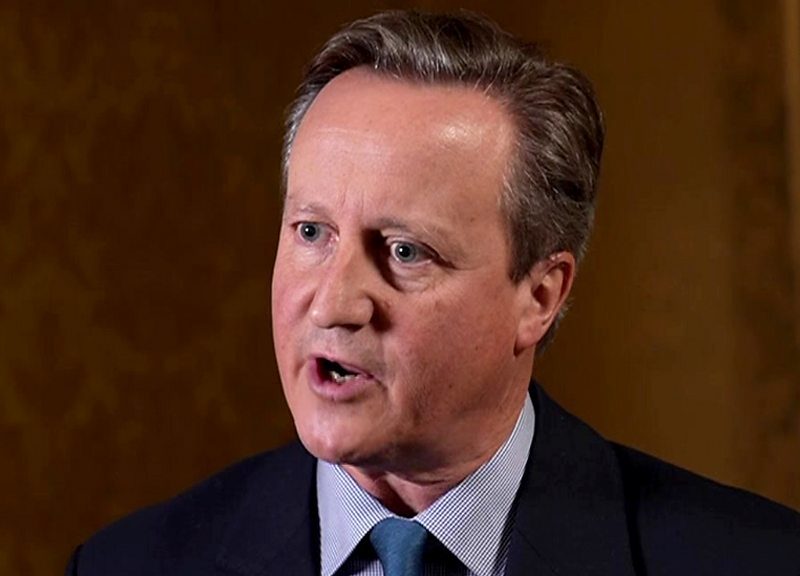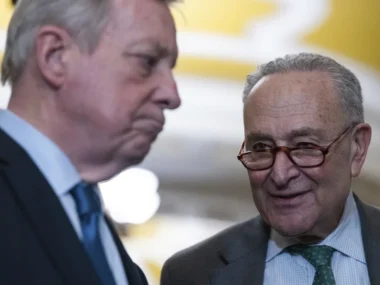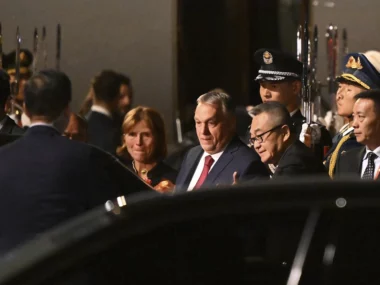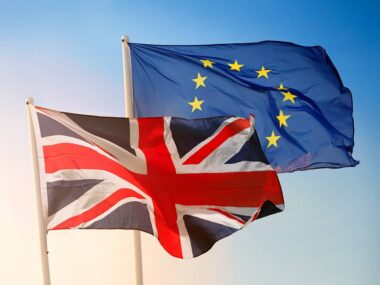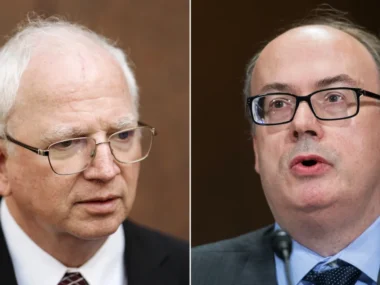David Cameron expressed his intention to assist Prime Minister Rishi Sunak during a challenging period, following his dramatic return to the government during a significant cabinet reshuffle.
The ex-prime minister has been designated as the foreign secretary and has agreed to accept a peerage for this role. He took over from James Cleverly, who assumed the position of home secretary after Rishi Sunak dismissed Suella Braverman.
Acknowledging the uncommon nature of a former prime minister’s return, Lord Cameron conceded that his reentry was unusual. However, citing the formidable challenges the nation faces, particularly in the Middle East and Ukraine, he expressed optimism that his prior experience could benefit Mr. Sunak’s government.
“I’ve chosen to join this administration because I believe Rishi Sunak is a capable prime minister dealing with a challenging situation,” Lord Cameron stated. “I aim to lend my support to him.”
Later, the Foreign Office confirmed that Mr. Cameron had a conversation with US Secretary of State Antony Blinken on Monday evening. They discussed various topics including the conflict in the Middle East, affirming Israel’s right to self-defense, the necessity for humanitarian pauses to facilitate the safe delivery of aid into Gaza, as well as their continued support for Ukraine and the robust relationship between the UK and the US.
The dismissal of Mrs. Braverman instigated Monday’s cabinet reshuffle by Mr. Sunak, whose party trails significantly behind Labour in opinion polls after more than 13 years in power.
Mr. Sunak’s decision to remove Mrs. Braverman came following her criticism of the Metropolitan Police for bias in managing protests.
A spokesperson for the prime minister highlighted the significance of a “unified team” while acknowledging the differences in approach between Mrs. Braverman and Mr. Sunak.
Speaking at the Lord Mayor’s Banquet in London, Mr. Sunak emphasized the challenging global circumstances, expressing the responsibility to shape these events. He praised Mr. Cleverly’s work on Ukraine during his tenure as foreign secretary and announced his pleasure in appointing a new foreign secretary who would build upon the achievements of the past year.
The return of Lord Cameron and the dismissal of Mrs. Braverman, who holds popularity within the right wing of the Conservative Party, risked further divisions among MPs.
Former Cabinet minister Sir Jacob Rees-Mogg cautioned that the Conservatives were at risk of losing votes to the Reform party.
Reform party leader Richard Tice expressed contentment and anticipated celebrations at the Reform party headquarters, remarking on the changes made.
Significant changes included Steve Barclay assuming the role of environment secretary from Therese Coffey, and Victoria Atkins being appointed as health secretary. Richard Holden took over as Tory party chairman from Greg Hands, while other senior cabinet members such as Chancellor Jeremy Hunt, Defence Secretary Grant Shapps, and Education Secretary Gillian Keegan retained their positions.
Lord Cameron’s appointment took Westminster by surprise, marking the first instance of a former prime minister re-entering government since the 1970s.

David Cameron holds the distinction of being the initial former prime minister to make a return to the government since the 1970s.
The surprising move marked a sudden return to the forefront of politics, occurring seven years after Lord Cameron’s resignation as prime minister following the UK’s decision to exit the European Union in 2016.
Despite campaigning for the UK to remain in the EU, Lord Cameron has maintained a relatively low public profile since departing from active politics. He expressed regret over the swift end of his political career in his 2019 memoir.
As a former prime minister critical of several decisions made by Mr. Sunak’s government—particularly the cancellation of the northern section of the HS2 rail link and the reduction in the UK’s aid budget—Lord Cameron’s stance was notable. In contrast, Mr. Sunak, in his speech at the Tory conference, aimed to differentiate himself from his predecessors and presented himself as a “change” prime minister.
Lord Cameron acknowledged his disagreements with some of the specific choices made by Mr. Sunak’s government but emphasized the collaborative nature of politics. He accepted the collective responsibility that comes with being a member of the cabinet team.
While centrist Tory MPs welcomed Lord Cameron’s return, Brexit supporters within the party criticized it. The Liberal Democrats have called for the blockage of Lord Cameron’s peerage, citing his involvement in lobbying for the collapsed finance company Greensill Capital.
Senior Labour MP Pat McFadden regarded Lord Cameron’s appointment as undermining the prime minister’s claim of offering a departure from 13 years of Conservative Party shortcomings.
Lord Cameron clarified that he resigned from various business and charitable positions, including his role as president of the Alzheimer’s Society, following his resignation as prime minister. He stressed his sole focus on the role of foreign secretary, aiming to work with the prime minister to ensure the UK’s security and prosperity in a challenging and precarious global environment.
Regarding the Greensill affair, the foreign secretary asserted that it was a resolved matter of the past.
Cabinet Overhaul
The reshuffling of ministers occurred following increased criticism directed at Mrs. Braverman concerning her comments about policing before a pro-Palestinian march in London during the weekend.
Mrs. Braverman disregarded the Prime Minister’s authority last week by publishing an unauthorized article that accused the police of “double standards” during protests. She claimed that right-wing protesters were rightfully met with a strict response, while “pro-Palestinian mobs” were largely neglected.
Opposition parties, including Labour, criticized Mrs. Braverman, asserting that her statements exacerbated tensions between the pro-Palestinian march and far-right counter-protesters on Saturday, leading to nearly 150 arrests.
Transport minister Huw Merriman acknowledged that the party had experienced a challenging week due to certain comments, stating that Mr. Sunak’s revamped cabinet would seek to resonate with the country.
However, former Tory treasurer Lord Cruddas criticized Mr. Sunak’s overhaul, labeling it a “coup” orchestrated by those who supported remaining in the EU.
The reshuffle marks the first instance since the Conservatives’ victory in the 2010 election where none of the four most senior cabinet positions are held by women.
Regarding other changes:
- Laura Trott has been elevated to the role of Treasury Chief Secretary.
- The former chief secretary, John Glen, has assumed the position of Paymaster General.
- Mr. Hands was designated as a minister within the Department for Business and Trade.
- Esther McVey, the former work and pensions secretary, returned to government as a Cabinet Office minister.
- Lee Rowley has taken on the role of housing minister, succeeding Rachel Maclean in that position.

